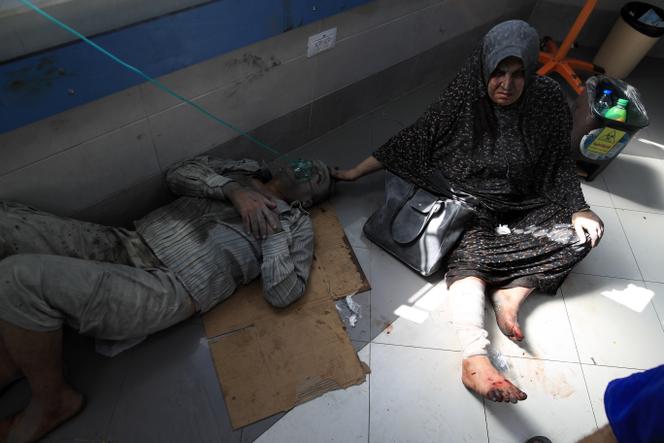


In a video filmed in Gaza's Al-Shifa hospital, a man lies on a stretcher on the floor, another wounded man sits against the wall of a noisy corridor and nurses bustle around them. The medical facility, the largest in the Gaza Strip, is operating at 150% capacity. Early on the evening of Wednesday, October 25, other images posted on social media showed its facade plunged into darkness. In 24 to 48 hours, most hospitals in the Palestinian enclave will be without electricity, due to a lack of fuel to run their generators. Patients in intensive care, those needing dialysis and the 130 babies currently in incubators in Gaza will find themselves condemned to an almost certain death.
Israel is imposing an almost total state of siege on the Gaza Strip in retaliation for the Hamas attack on its territory on October 7, which killed 1,400 people. For the past 19 days, the Israeli army has been continuously bombing the Palestinian enclave governed by the Islamist movement. More than 6,500 Gazans have been killed and over 17,000 wounded, according to the latest figures from the local Health Ministry. On Tuesday alone, 700 Palestinians were killed, according to the same source – an all-time record.
The Gazan health system, already severely weakened by the Israeli blockade that has lasted for more than 16 years, "has collapsed," the ministry said on Wednesday, describing hospitals unable to cope with the continuous influx of wounded, many of whom have serious injuries that are complex to operate on and will require follow-up care for years. Some are left on the ground without the necessary care. Many lose their lives in the process, reports the ministry's press release.
"Twelve hospitals are already out of service [out of a total of 35], either because they've been bombed or because they've run out of fuel, and the rest of the facilities are receiving patients beyond their capacity," warned Nebal Farsakh, spokesperson for the Palestinian Red Crescent Society. Over 90% of medicines have run out, according to the director general of Al-Shifa hospital, Dr. Mohamed Abou Salmiya. Some doctors reported they had performed operations without anesthesia. Images show surgeons working by flashlight or cell phone.
Around 60 humanitarian aid trucks have entered the enclave in recent days. Before the war, several hundred were supplying the population on a daily basis. On Wednesday, a French military ship set sail to provide aid to Gazan hospitals. The World Health Organization (WHO) is calling for an "immediate humanitarian ceasefire." Two resolutions to this effect, one American and the other Russian, failed at the Security Council on Wednesday evening. NGOs have run out of words to warn of the gravity of the situation for Gaza's 2.4 million inhabitants. "Starvation is being used as a weapon of war against Gaza civilians," denounced Oxfam, pointing out that supermarkets and several bakeries have been targeted by Israeli bombardments.
You have 45% of this article left to read. The rest is for subscribers only.
